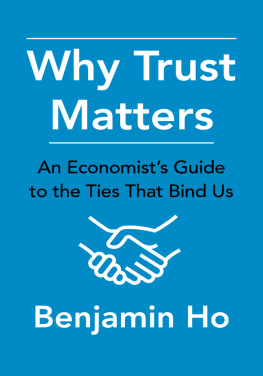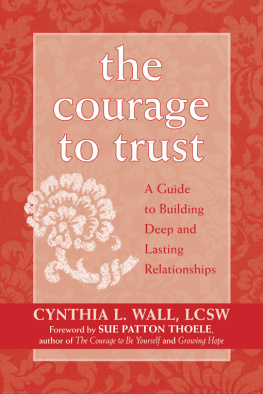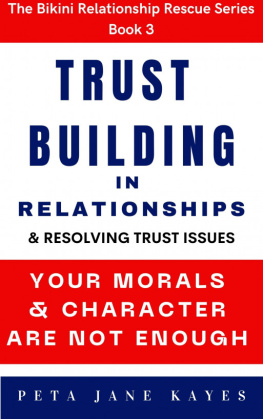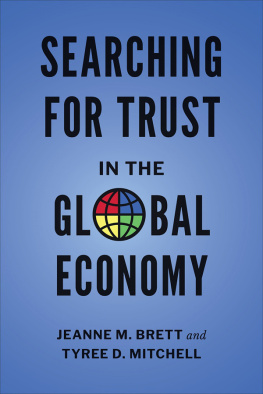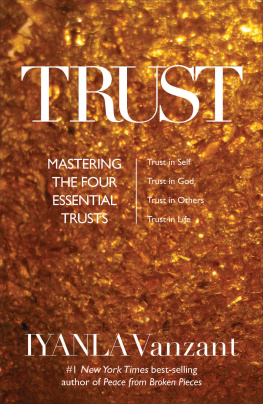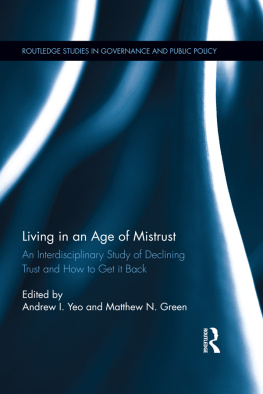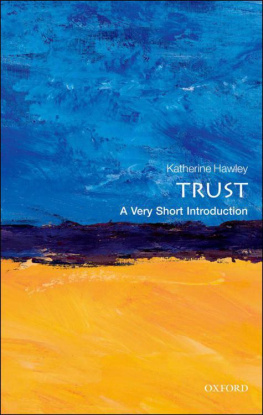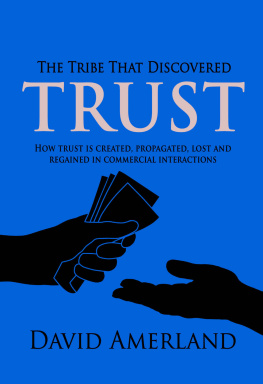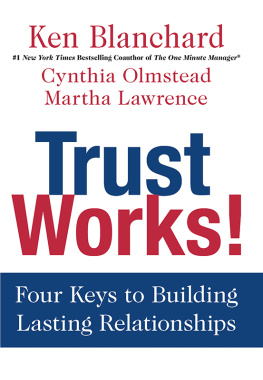Table of Contents
Why Trust Matters
WHY TRUST MATTERS
An Economists Guide to the Ties That Bind Us
BENJAMIN HO
Columbia University Press New York
Columbia University Press
Publishers Since 1893
New YorkChichester, West Sussex
cup.columbia.edu
Copyright 2021 Benjamin Ho
All rights reserved
EISBN 978-0-231-54842-7
Library of Congress Cataloging-in-Publication Data
Names: Ho, Benjamin Tseng author.
Title: Why trust matters : an economist's guide to the ties that bind
us / Benjamin Ho.
Description: New York City : Columbia University Press, 2021. |
Includes index.
Identifiers: LCCN 2020051482 (print) | LCCN 2020051483 (ebook) |
ISBN 9780231189606 (hardback) | ISBN 9780231548427 (ebook)
Subjects: LCSH: TrustEconomic aspects. |
EconomicsPsychological aspects. | Game theory.
Classification: LCC HB72 .H596 2021 (print) |
LCC HB72 (ebook) | DDC 330.01/9dc23
LC record available at https://lccn.loc.gov/2020051482
LC ebook record available at https://lccn.loc.gov/2020051483
A Columbia University Press E-book.
CUP would be pleased to hear about your reading experience with this e-book at .
Cover design: Milenda Nan Ok Lee
Cover image: kadirkaba iStock
Brief Contents
T hank you to all the many readers, students, and former students who gave comments and feedback of early drafts along the way. Writing a book is daunting, and you worry that nothing you write makes any sense. Comments and suggestions provided helpful reassurance that at least some parts of the book now make some sense to at least some people.
Thank you all of my former students, and in particular to Ivy Teng, Stephanie Coons, Zoey Chopra, Eric Heydorn, and Sanaya Shikari for their detailed comments.
Thank you to my research assistant, Diana Henry, whom I hired because she never hesitated to challenge my ideas. She helped greatly in thinking through the structure and themes of the book. Thank you also to my line editor, Sara Streett, whose careful and critical reading did much to clarify my prose and my thinking. Thank you to Seth Stephens-Davidovitz for his guidance. Thank you to my friend Reza Hasmath for our long discussions about trust that helped inspire this book.
Thank you to my great and supportive editors at Columbia University Press, Bridget Flannery-McCoy, Eric Schwartz, and Christian Winting.
Thank you to my PhD advisor Edward Lazear, who passed away shortly before this book came to print. While I was still a student, he told me to always sign and dedicate every gift copy of the book that he was sure I would one day write. I was excited to dedicate the first copy to him. His influence is everywhere in this book, particularly his unwavering faith in the ability of economics to uncover universal truths. He will be greatly missed.
Thank you to all my professors, friends, and colleagues who have shaped my intellectual journey, challenged my ideas and forced to refine my thinking.
Thank you to my mom, Lan Ho, for making me the person I am today, and my brother Andy Schlesinger, for always keeping me honest.
Finally, thank you to my wife, Romina Wahab, who has supported me every step of the way, and to my children for their inspiration and for always reminding me about what is most important.
H ave you ever thought about how amazing it is that we tend to trust one another and about what it took to get us here? Not long ago, life, as the philosopher Thomas Hobbes characterized it in the 1690s, was nasty, brutish, and short, a war of all against all, but today, we can walk down the street feeling relatively safe, buying things from anonymous strangers, like the book you are reading now.
Just think about all the little leaps of trust that brought you here, reading my book about trust. You had to trust the bookseller to give you a book in exchange for your money and not just take the money and run. Or if you made the purchase online, you had to trust your bank or Visa or Mastercard to accurately keep track of your money or credit and transfer the proper amount to the booksellers account. You had to trust the booksellers website to not steal your account information. Alhough you may not have thought about it, you also had to trust the central bank that issued the currency that you used to pay for the book to maintain the value of the money you used. We dont always think about this, but every action that we take in our complex, interdependent societybuying a book, driving to work, dropping the kids off at school, picking up groceriesrequires the combined efforts of countless numbers of people working in concert to enable that thing to happen. It seems risky when you do stop to think about it: people can be unreliable, and the more people we depend on, the greater the risk.
How, then, did our society (particularly our global society) grow so complex and interdependent? Economic historians could tell a long and interesting story about the growth of trade, the development of technology and the advantages of specialization, and the role of capital investment in fueling innovationbut this story ultimately rests on a deeper one. This is the story of the it factor that enables trade and specialization and investment and innovation. It is a story that goes all the way back to the beginning of human civilization and all the way down to the bedrock of our relationships with one another. It is the story of how we learned to rely on one another in spite of the risks.
It is the story (the history) of trust.
As I see it, the story of human civilization is the story of how we learned to trust one another. In the beginning, humanity lived in small tribes. We learned that we could accomplish more together than alone. Members of a group could hunt larger prey and better defend themselves from predators. But working with others involves relying on others, and trust becomes more difficult as the number of others increases. As civilization grew and became more complex, people moved to cities and organized themselves into guilds and city-states and nations. Living with more people required learning to trust in new ways, and institutions developedthrough religion, markets, and the rule of lawthat enabled the development of ever-more-complex societies and the coordination of ever-larger networks of people. This is the process that brought us to the modern economies and societies of the twenty-first century, even as our premodern tribal instincts continue to structure modern life.
This book will examine how trust structures our religions and our workplaces, how trust informs how we apologize and why we laugh. The brands we buy and the politicians who run our democracies all seek to win our trust. Every time we interact with another person under conditions of uncertainty, we are engaging in an act of trust.
If youre surprised to learn that trust is something economists care about, Im not surprised. Perhaps you see trust as falling within the purview of other social sciencespsychology, anthropology, or sociology, or perhaps even philosophy. You would be right, and part of the goal of this book is to see what economics can learn from those other disciplines. But trust is deeply important to economics as well. Even the word trust is deeply entwined with how we think about the economy. A bank is sometimes called a trust; many corporations are managed by trustees; money saved for our children can be placed in a trust.

